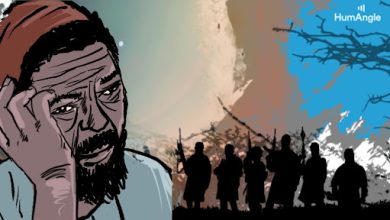Displaced Girls In Borno Dream Of Education But Their Communities Have No Schools
Many young women and girls who fled their homes and now live in Maiduguri because of the conflict in northeast Nigeria, can no longer go to school. Despite the efforts of a humanitarian organisation, they have not returned to education, but they still harbour huge ambitions.
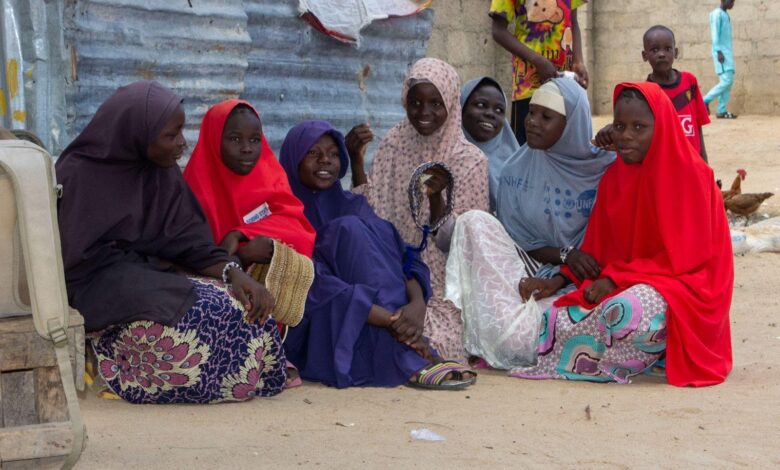
Amina Usman, 18, is passionate about defending the rights of girls in her community. For this reason, she wants to become a lawyer.
Another 18-year-old, Falmata Bukar, on the other hand, wants to become a doctor. She reckons she could help poor women that way.
Sadly, both had to abandon their dreams of getting an education before they were even 14 years old, and before they reached Senior Secondary School One (SSS1).
At this point, they have both missed out on at least four years of school.
These cases are not isolated. It is a common experience among girls in their community to have aspirations cut short due to a lack of funds and access to public education.
That is because Aisha and Falmata are just two of tens, if not hundreds, of thousands of girls who have been displaced from their homes by the war against insurgents in Nigeria’s North East.
Many internally displaced people in the Borno state capital Maiduguri are concentrated in the communities of Sulumri, Goni Chariri, and Fulatari, all in the Maisandari ward of the city, which represents most of the entire southwest quadrant of Maiduguri.
Across the Maiduguri metropolitan council area as a whole, there are 55 state-run schools. But in the three communities where these IDPs live, there is not a single school to be found.
Instead, an international aid organisation, Save the Children, has stepped in and given the young women some hope.
But even by the charity’s own admission, what is on offer is no substitute for school.
Their communities
All three communities are mostly made up of Internally Displaced People (IDPs) who fled Damboa and Konduga in Borno State.
They set up new communities in areas that had low population density when they arrived. These areas did not have schools because there at the edge of the city, places in the process of being built upon. There were not enough people living there at the time.
But in a short period, seemingly overnight, these communities suddenly were packed with people needing services.
In the whole Metropolitan Council area there are 15 public secondary schools and 40 Basic Education Public schools.
However, there is not a single public school in Sulumri and Goni Chariri or Fulatari at all. This was confirmed by both the community leaders of the communities, and the girls’ parents.
There is one private school in the ward; Hadiza Memorial School, Maiduguri. HumAngle gathered that fees for the primary section are ₦10,000 ($13) primary, ₦11,000 ($14) for the Junior Secondary School and ₦14,000 ($18) for the Senior Secondary.
There is simply no way that their parents, Modu Bukar, a 47-year-old former pick-up driver and Zara Usman, a 43-year-old housewife and petty trader, can afford the fees.
Public schools in Maiduguri are supposed to be free, but the reality is students also have to pay charges.
Amina used to attend a Junior Secondary School. She paid ₦1,200 ($1.57) to the school every term, and a “PTA levy”, an extra payment to teachers.
According to Babagana Abatcha, a head teacher under the Local Education Authority (LEA), before students are registered into public schools in the state, they are levied ₦500 (£0.65) as a registration fee. When it is time for those in Junior Secondary School to sit for Basic Education Certificate Examination, they pay another ₦1,500 ($1.96).
Shattered dreams
The struggles of these girls are not isolated incidents but reflect a larger social issue that plagues the communities. The unavailability of free public schools has made education a distant dream, casting a shadow over the aspirations of many.
The Borno State government’s has in the past announced efforts to establish 25 Mega Schools from May 2019 to Jan. 2023 to address this problem. But the “Mega School” programme has run into difficulty, and many remain unfinished and unopened. The girls in Sulumri, Goni Chariri, and Fulatari remain without a school.
Unfortunately, Amina had to drop out of Moduganari Junior Secondary School. Although a public school, her father was unable to continually pay her transportation fare or afford to buy her study materials.
The distance from Sulumri to Moduganari is approximately 12 km and there is no closer option for students like Amina.
Hope again
This is where Save the Children have stepped in.
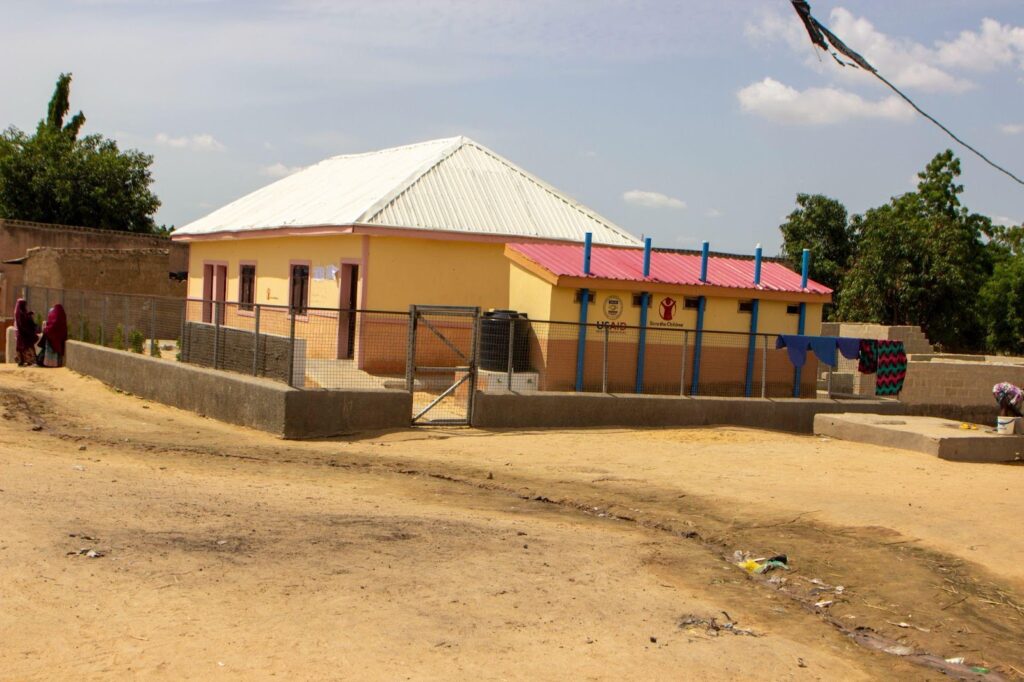
Many of the children and young women of the displaced communities congregate at a small building known as “the Safe Space”, which Save the Children built in Sulumri.
Amina told HumAngle: “Save the Children teaches us. They teach us vocational skills like cap knitting for sustenance and enlighten us on education and reporting cases of violence against us. They also teach us how to form some words in English.”
At the safe space the charity provides what they call “psycho-social support”.
The safe space provided a nurturing environment, creating possibilities beyond their immediate surroundings. However, the capacity constraints are evident, and providing education for all out-of-school girls still proves elusive.
Mary Musa Dibal, a volunteer with the organisation working in the safe space in Sulumri explained that they had conducted a house-to-house sensitisation.
“Being a community-based programme, we informed the community leaders about the activities we intend to carry out as an organisation in his community and even now do involve him in certain decisions we make to ensure everything we do is contextually okay.
“As for eligibility, a child’s name will only qualify to be written in our registers if he or she attends three times; that’s the minimum.”
Blessing Ali Malgwi, another volunteer who teaches at the safe space added that it is open to children from ages three to 17. “Every age group has its class; three to six, seven to ten, 11 to 13, and 14 to 17, each with its class and teacher. We don’t teach formal education; we teach life skills like cap knitting, hand fan making et cetera,” she said. “We don’t discriminate while enrolling. We go to their homes to pick them. We also do a follow-up, requesting feedback from parents on the performances of their children.”
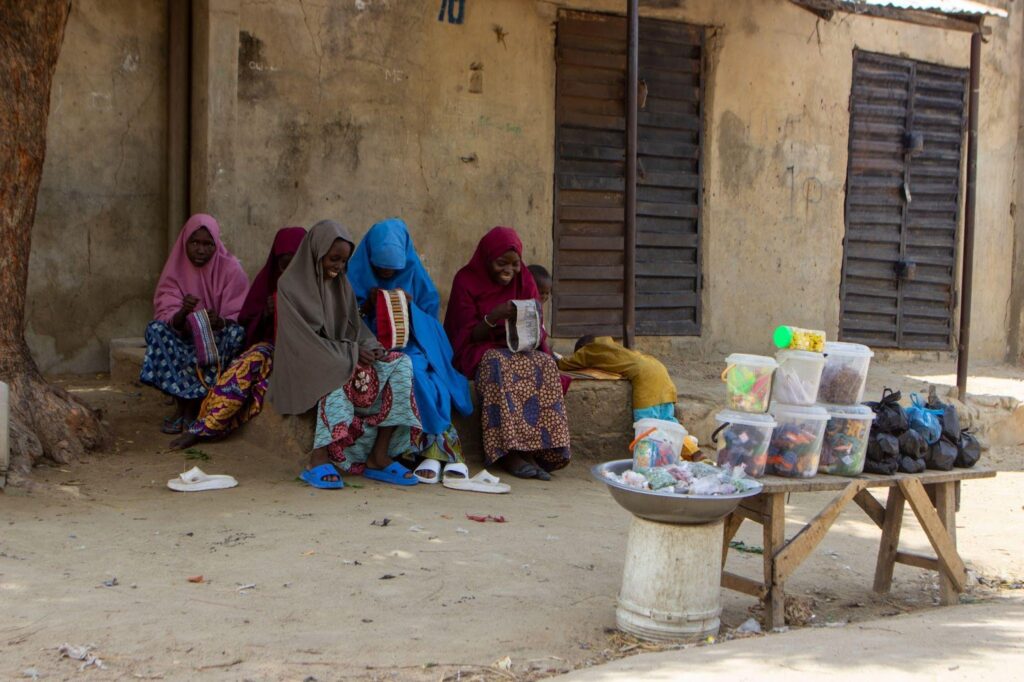
This, however, comes with challenges.
Psycho-social support is not the same as education in maths and English.
Mary revealed that there are instances where some children stop coming to the safe space because they could not get the complete educational activity required. The girls want to grasp knowledge and qualifications in maths and English, but the programme on offer is not up to that.
“The sole aim of our project is to administer psychosocial support to children and also identify gender-based violence cases as well as other child protection concerns,” Mary Musa Dibal said. “Most of the children enjoy coming, knowing it’s the only option they have since most of them are either never enrolled in school before or are out-of-school children. So far, I haven’t heard of any case where a parent denied their child access to attending.”
Blessing added that there is a major challenge with the turn-out of locals, especially during the rainy season. This is when the girls go to the farm with their families. “And most of the girls whose attendance drops are those between ages 14 to 17,” she pointed out.
But the turnout is usually overwhelming during the dry season. “In fact, we often teach them outside the classes as we lack the space to accommodate them. We have 19, 20 or 25 girls between ages 14 to 17 now. However, during the dry season, they reach up to 40 or more.”
Then, she continued, there is the problem of parents, especially of older children, expecting that money, food items and other provisions would be given to their girls. When they realise that none of these are forthcoming, they discourage their children from attending.
Keeping their dreams alive
Teenagers like 18-year-old Falmata Bukar, however, keep coming for the little education they can get, after all, they say, little is better than nothing.
Determined to become a medical doctor, Falmata is not discouraged even after dropping out at SS1 from Lamisula Senior Secondary School, a public school. It was about 10 km away from her home and she eventually had to give it up for lack of money for transportation.
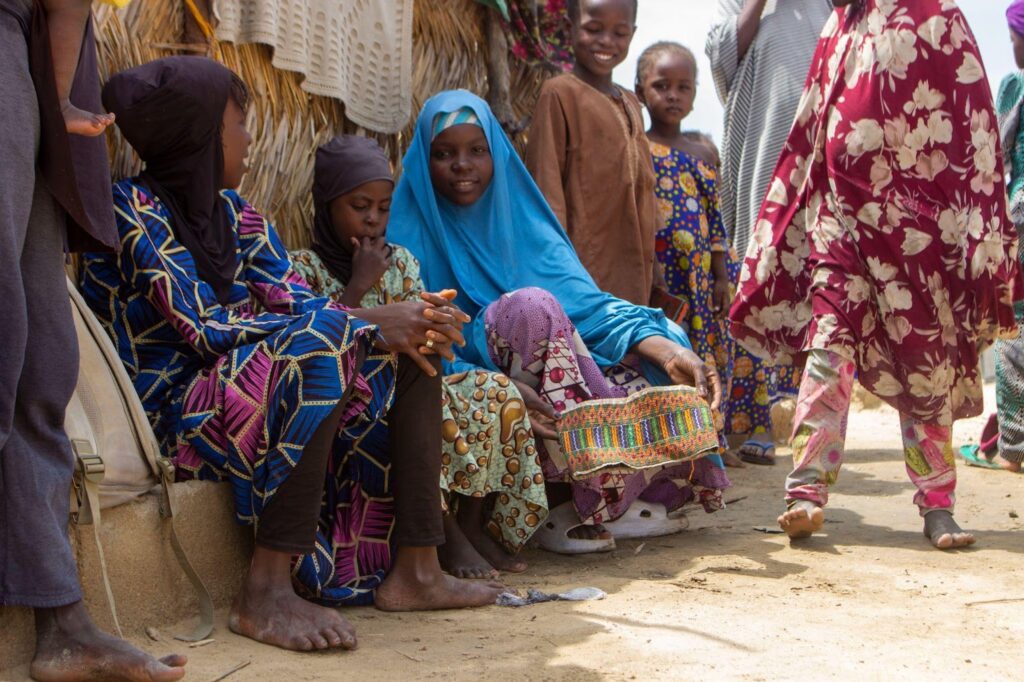
Fatima Mohammed Ibrahim, 15, also dreams of becoming a medical doctor with a special interest in delivering pregnancies. But the closure of Bakassi IDP camp in Maiduguri, Borno’s capital where she studied as a Junior Secondary one student, brought her dreams to a halt.
“I was not enrolled in another school afterwards. My parents do not have the means,” she told HumAngle.
There is also Saratu Modu, 17, who was also no stranger to education before her community in Bama was displaced. Having completed primary six, she too aspires to become a medical doctor. “I want to care for the needs of women and children,” she said.
“In this community, one of the main reasons why children, not just the girls, are out of school is the unavailability of government schools here. And many parents cannot afford private schools, which is limited to Hadiza Memorial in the community,” said Yusuf Samuel Jimeta, a Community Case Worker for Save the Children.
“We have engaged the government through the community, but the government’s response is slow. Education is very important and necessary for the life of a woman,” a resident, Modu Bukar, emphasised.
As at the time this report was filed, HumAngle had still not gotten a response from the Borno State Ministry of Education concerning the three communities.
An IDP from Konduga, Bukar has six daughters none of which attend school because he lacks the means to sponsor them.
“Even before our displacement, there were no schools in our village in Konduga, so they didn’t attend school there either. I wanted them to go to school here, but I couldn’t afford it. The little I earn today is barely enough to feed them. I believe in education for both boys and girls, but because there is no way to enrol them, I couldn’t do it,” he said.
Many of these girls had a small sample of education, just enough to let them know the possibilities it could afford them, to give them something to dream for, before their circumstances ripped it away.
In Amina Usman’s case, the major reason she wanted to become a lawyer was so she could protect girls’ rights. “Like rape victims,” she said, “they don’t get justice as victims most of the time.”
But for the time being her dreams of becoming a lawyer are on hold.
Al’amin Umar is a HumAngle Accountability Fellow from Borno State. This Article is part of the project; ‘Promoting Transparency in Insurgency-Related Funding in Northeast Nigeria’ in partnership with the MacArthur Foundation.
Summary not available.
Support Our Journalism
There are millions of ordinary people affected by conflict in Africa whose stories are missing in the mainstream media. HumAngle is determined to tell those challenging and under-reported stories, hoping that the people impacted by these conflicts will find the safety and security they deserve.
To ensure that we continue to provide public service coverage, we have a small favour to ask you. We want you to be part of our journalistic endeavour by contributing a token to us.
Your donation will further promote a robust, free, and independent media.
Donate HereStay Closer To The Stories That Matter




